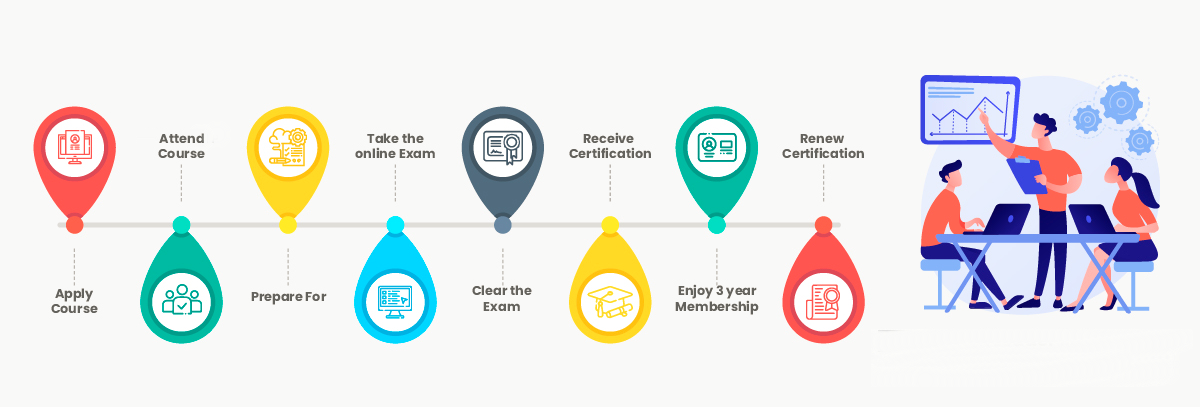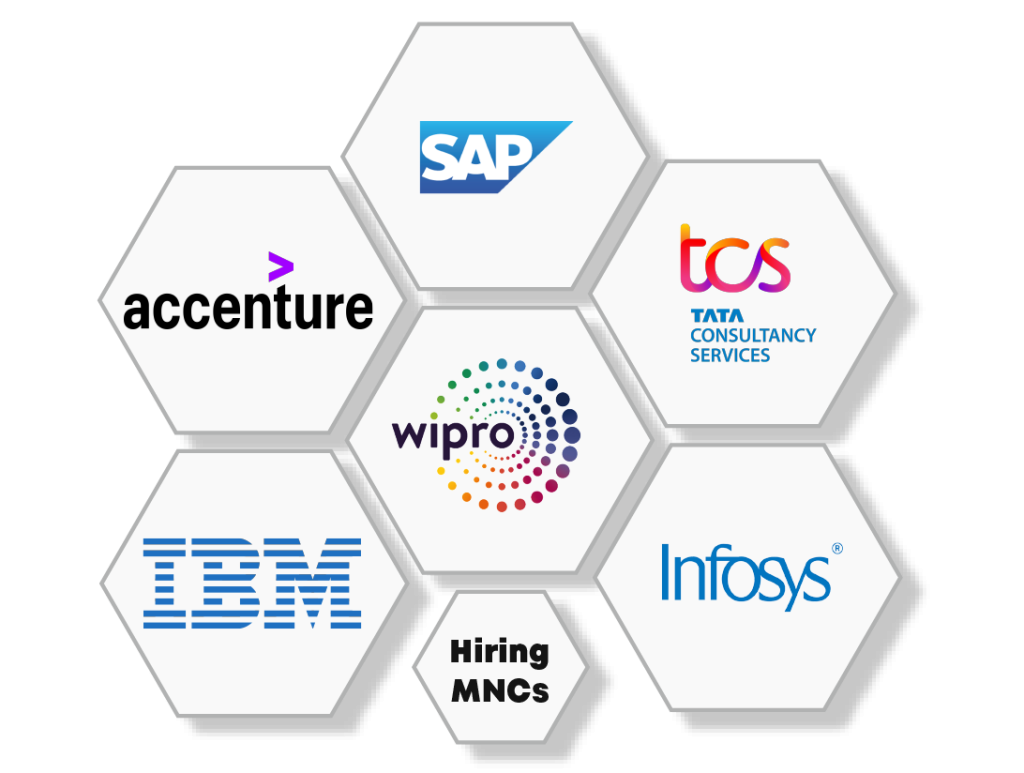
Sambodhi and Education Nest’s OpenShift training classes are designed to equip learners with comprehensive knowledge of all the key features and fundamentals of OpenShift. The course covers topics such as containers, Kubernetes, Red Hat OpenShift Container Platform, and provides hands-on exercises to manage containers effectively. OpenShift is a cloud-native platform that enables developers to quickly develop, deploy, and manage applications in a cloud environment. With OpenShift, developers can build, deploy, and manage applications securely and at scale. OpenShift also offers a platform for running applications in a hybrid cloud environment, leveraging both public and private clouds’ benefits. This course provides an opportunity for learners to gain expertise in OpenShift, enabling them to leverage this cloud platform’s potential for their projects and future endeavors.
Application Deadline: Jun 30, 2023
Upskill for Your Dream Job
Sambodhi and Education Nest provide an extensive OpenShift Training Course designed to equip learners with the necessary skills and knowledge to excel in the field of containerization and orchestration. This live project-based training program ensures a practical learning experience, enabling participants to apply their newfound expertise in real-world scenarios. With a team of industry experts boasting over 10 years of experience, our instructors have developed unique teaching styles to effectively guide and mentor aspiring candidates. Through this course, participants will gain a deep understanding of OpenShift, learning concepts such as containerization, deployment, scaling, and management of applications. They will also acquire hands-on experience with OpenShift tools, techniques, and best practices, ultimately becoming proficient in implementing and managing containerized applications using OpenShift. Join our OpenShift Training Course and unlock your potential in this rapidly evolving field.



Instructor-led OpenShift live online Training Schedule
May 15th – Weekend
July 1st – Weekend
Why enroll for OpenShift Certificate Training Course?


The demand for OpenShift professionals is projected to grow significantly as organizations adopt cloud technologies. The job market is expected to increase by around 20% annually in the US and globally.

OpenShift professionals are in high demand across industries and MNCs, with growing demand for cloud infrastructure and app development expertise.

OpenShift professionals earn an average salary of $107,000 per year in the United States, but experienced individuals can earn over $150,000. Salaries are expected to rise due to the growing popularity and demand.
OpenShift Training Course Benefits
Sambodhi and Education Nest’s OpenShift training program offers several benefits for professionals looking to advance their careers in data management. OpenShift was recently recognized as one of the best tools and technologies for developers, IT professionals, and businesses. This course provides learners with the skills and knowledge required to become Certified Red Hat OpenShift professionals, who are among the highest-paid IT professionals today. Additionally, there are numerous job opportunities for OpenShift professionals worldwide, with top companies actively recruiting experts in this field. By completing this course, learners will be equipped to pursue exciting career opportunities and leverage the growing demand for OpenShift professionals.

Annual Salary

Hiring Companies
Want to become a OpenShift Professional?
Why OpenShift Certificate Training Course from Education Nest






OpenShift Skills Covered
OpenShift Training Course Syllabus
OpenShift Training Projects

OpenShift projects play a pivotal role in the retail industry, empowering businesses to leverage the benefits of cloud-native technology for application development and deployment. With OpenShift, retail companies can enhance their digital presence by developing and scaling applications quickly and efficiently. These projects enable retailers to create responsive and scalable e-commerce platforms, streamline inventory management systems, and optimize customer experiences. OpenShift's containerization and orchestration capabilities ensure seamless scalability, allowing retailers to handle increased online traffic during peak seasons. By leveraging OpenShift, retailers can embrace cloud-native architectures, accelerate innovation, and deliver reliable and secure applications to meet the evolving demands of the modern retail landscape.

OpenShift projects play a vital role in the IT industry, particularly in the realm of cloud-native application development and deployment. OpenShift enables organizations to leverage containerization and orchestration capabilities, providing a scalable and flexible platform for managing applications in the cloud. These projects involve designing, implementing, and managing containerized environments, ensuring efficient deployment, scaling, and monitoring of applications. OpenShift projects also focus on optimizing resource utilization, enhancing security, and facilitating continuous integration and delivery (CI/CD) pipelines. By leveraging OpenShift, IT companies can streamline application development, improve operational efficiency, and enable rapid innovation in the ever-evolving digital landscape.
OpenShift Training Description
The OpenShift course is a comprehensive training program designed to equip learners with the skills and knowledge required to excel in cloud-native application development and management. This course offers hands-on, project-based training, enabling participants to gain practical experience in deploying, scaling, and monitoring applications using OpenShift. With a focus on containerization, orchestration, and CI/CD pipelines, the course covers key concepts and techniques essential for leveraging OpenShift effectively. By completing the OpenShift course, learners enhance their ability to meet the growing demand for skilled professionals in the IT industry and contribute to the success of organizations adopting cloud technologies.
The objectives of the OpenShift course are as follows:
Understand the fundamentals of OpenShift: Gain a comprehensive understanding of the key concepts, components, and features of OpenShift.
Master containerization and orchestration: Learn how to containerize applications and leverage OpenShift’s orchestration capabilities for efficient management and scaling.
Implement CI/CD pipelines: Gain practical experience in setting up continuous integration and delivery pipelines using OpenShift, enabling streamlined application deployment.
Develop skills in application deployment and scaling: Learn techniques to deploy and scale applications effectively on the OpenShift platform.
Enhance application monitoring and management: Acquire knowledge of monitoring tools and techniques to ensure optimal performance and resource utilization.
Understand security and compliance: Learn about security measures and best practices for securing applications and complying with industry standards.
Gain hands-on experience: Participate in real-world projects and practical exercises to apply OpenShift concepts and techniques in a simulated environment.
Prepare for OpenShift certifications: Build the skills and knowledge necessary to pursue relevant certifications in OpenShift.
Stay updated with the latest trends: Stay informed about the latest developments and advancements in the field of cloud-native application development and management.
Enhance career prospects: Boost your career prospects by acquiring in-demand skills in OpenShift, making you a valuable asset for organizations adopting cloud technologies.
There are several compelling reasons to learn the OpenShift course. Here are the key points:
High Demand: OpenShift professionals are in high demand across industries due to the widespread adoption of cloud-native technologies and the need for efficient application deployment and management.
Career Opportunities: Learning OpenShift opens up a wide range of career opportunities, as companies of all sizes and sectors are actively seeking skilled professionals to leverage OpenShift for their cloud infrastructure and application development needs.
Cloud-native Expertise: OpenShift is a leading cloud-native platform, and acquiring proficiency in it equips you with valuable skills and knowledge in containerization, orchestration, and application management in the cloud.
Efficiency and Scalability: OpenShift enables organizations to deploy and scale applications efficiently, optimizing resource utilization and providing flexibility for growing workloads.
DevOps Integration: OpenShift plays a crucial role in the DevOps workflow, allowing for seamless integration of continuous integration, delivery, and deployment pipelines, enhancing collaboration and productivity.
Industry Standard: OpenShift is widely used by major industry players, making it a sought-after skill set that enhances your professional credibility.
Innovation and Agility: OpenShift empowers organizations to innovate and adapt quickly by providing a platform for rapid application development, deployment, and management.
Open Source Community: OpenShift is supported by a vibrant open-source community, offering access to a vast pool of resources, documentation, and community-driven support.
Certification Opportunities: Learning OpenShift opens doors to certification programs, enabling you to validate your skills and enhance your professional credentials.
Future-proofing Skills: With the increasing demand for cloud-native technologies, learning OpenShift ensures you stay relevant and future-proof your career in the evolving IT landscape.
The OpenShift is suitable for a wide range of individuals, including:
The pre-requisites for the OpenShift course are as follows:
Basic Knowledge of Linux: Familiarity with Linux operating system fundamentals, including file system navigation, command-line usage, and basic system administration.
Understanding of Containers: A basic understanding of containerization concepts, such as Docker, container images, and container management, is beneficial for comprehending OpenShift’s containerization capabilities.
Knowledge of Networking: Familiarity with networking concepts, including IP addressing, ports, and protocols, is recommended to grasp networking aspects related to OpenShift deployments.
Understanding of Virtualization: Basic knowledge of virtualization technologies, such as hypervisors and virtual machines, helps in understanding the underlying infrastructure of OpenShift.
Experience with Application Development: Prior experience in application development using programming languages like Java, Python, or Node.js is advantageous for understanding the deployment and management of applications on OpenShift.
Familiarity with DevOps Concepts: Knowledge of DevOps principles, including continuous integration, continuous delivery, and version control systems, can help in understanding the role of OpenShift in the DevOps workflow.
In addition to the mentioned courses, Sambodhi and Education Nest offer a range of other niche courses to cater to diverse learning needs. Some of the notable courses include:
The OpenShift course is a comprehensive training program designed to equip learners with the skills and knowledge required to excel in cloud-native application development and management. This course offers hands-on, project-based training, enabling participants to gain practical experience in deploying, scaling, and monitoring applications using OpenShift. With a focus on containerization, orchestration, and CI/CD pipelines, the course covers key concepts and techniques essential for leveraging OpenShift effectively. By completing the OpenShift course, learners enhance their ability to meet the growing demand for skilled professionals in the IT industry and contribute to the success of organizations adopting cloud technologies.
The objectives of the OpenShift course are as follows:
Understand the fundamentals of OpenShift: Gain a comprehensive understanding of the key concepts, components, and features of OpenShift.
Master containerization and orchestration: Learn how to containerize applications and leverage OpenShift’s orchestration capabilities for efficient management and scaling.
Implement CI/CD pipelines: Gain practical experience in setting up continuous integration and delivery pipelines using OpenShift, enabling streamlined application deployment.
Develop skills in application deployment and scaling: Learn techniques to deploy and scale applications effectively on the OpenShift platform.
Enhance application monitoring and management: Acquire knowledge of monitoring tools and techniques to ensure optimal performance and resource utilization.
Understand security and compliance: Learn about security measures and best practices for securing applications and complying with industry standards.
Gain hands-on experience: Participate in real-world projects and practical exercises to apply OpenShift concepts and techniques in a simulated environment.
Prepare for OpenShift certifications: Build the skills and knowledge necessary to pursue relevant certifications in OpenShift.
Stay updated with the latest trends: Stay informed about the latest developments and advancements in the field of cloud-native application development and management.
Enhance career prospects: Boost your career prospects by acquiring in-demand skills in OpenShift, making you a valuable asset for organizations adopting cloud technologies.
There are several compelling reasons to learn the OpenShift course. Here are the key points:
High Demand: OpenShift professionals are in high demand across industries due to the widespread adoption of cloud-native technologies and the need for efficient application deployment and management.
Career Opportunities: Learning OpenShift opens up a wide range of career opportunities, as companies of all sizes and sectors are actively seeking skilled professionals to leverage OpenShift for their cloud infrastructure and application development needs.
Cloud-native Expertise: OpenShift is a leading cloud-native platform, and acquiring proficiency in it equips you with valuable skills and knowledge in containerization, orchestration, and application management in the cloud.
Efficiency and Scalability: OpenShift enables organizations to deploy and scale applications efficiently, optimizing resource utilization and providing flexibility for growing workloads.
DevOps Integration: OpenShift plays a crucial role in the DevOps workflow, allowing for seamless integration of continuous integration, delivery, and deployment pipelines, enhancing collaboration and productivity.
Industry Standard: OpenShift is widely used by major industry players, making it a sought-after skill set that enhances your professional credibility.
Innovation and Agility: OpenShift empowers organizations to innovate and adapt quickly by providing a platform for rapid application development, deployment, and management.
Open Source Community: OpenShift is supported by a vibrant open-source community, offering access to a vast pool of resources, documentation, and community-driven support.
Certification Opportunities: Learning OpenShift opens doors to certification programs, enabling you to validate your skills and enhance your professional credentials.
Future-proofing Skills: With the increasing demand for cloud-native technologies, learning OpenShift ensures you stay relevant and future-proof your career in the evolving IT landscape.
The OpenShift is suitable for a wide range of individuals, including:
The pre-requisites for the OpenShift course are as follows:
Basic Knowledge of Linux: Familiarity with Linux operating system fundamentals, including file system navigation, command-line usage, and basic system administration.
Understanding of Containers: A basic understanding of containerization concepts, such as Docker, container images, and container management, is beneficial for comprehending OpenShift’s containerization capabilities.
Knowledge of Networking: Familiarity with networking concepts, including IP addressing, ports, and protocols, is recommended to grasp networking aspects related to OpenShift deployments.
Understanding of Virtualization: Basic knowledge of virtualization technologies, such as hypervisors and virtual machines, helps in understanding the underlying infrastructure of OpenShift.
Experience with Application Development: Prior experience in application development using programming languages like Java, Python, or Node.js is advantageous for understanding the deployment and management of applications on OpenShift.
Familiarity with DevOps Concepts: Knowledge of DevOps principles, including continuous integration, continuous delivery, and version control systems, can help in understanding the role of OpenShift in the DevOps workflow.
In addition to the mentioned courses, Sambodhi and Education Nest offer a range of other niche courses to cater to diverse learning needs. Some of the notable courses include:
OpenShift Certificate Training Course reviews
Read learner testimonials
Shikha Kushwah
I highly recommend Sambodhi and Education Nest as an exceptional learning platform. The course curriculum, projects, and assignments exceeded my expectations. The availability of 24/7 support ensured prompt resolution of queries, and the lifetime access to course materials allowed convenient revisiting of the content whenever needed.
Ravikant T.
I thoroughly enjoyed this course! The instructor explained new concepts clearly, using easily understandable language. The exercises and challenges provided were instrumental in reinforcing my comprehension of the topics being covered.
Sylvia Sunandini
The learning experience is excellent, with a dedicated teaching faculty providing exceptional support. The courses are worth the investment, and the platform offers an excellent support system for any doubts or queries. Being registered with Sambodhi and Education Nest gives you the flexibility to choose a batch that suits your convenience, ensuring a comfortable learning journey.
Hear from our learners
Lorem ipsum dolor sit amet, consectetur adipiscing elit. Ut elit tellus, luctus nec ullamcorper mattis, pulvinar dapibus leo.
Lorem ipsum dolor sit amet, consectetur adipiscing elit. Ut elit tellus, luctus nec ullamcorper mattis, pulvinar dapibus leo.
Lorem ipsum dolor sit amet, consectetur adipiscing elit. Ut elit tellus, luctus nec ullamcorper mattis, pulvinar dapibus leo.
Like what you hear from our learners?
Creating Epic Presentations: Communicating Powerful Ideas reviews
OpenShift Training FAQs
If you miss an online OpenShift Training class, it’s important to reach out to the instructor or the support team of the online training platform you are using. They may be able to provide you with a recording or transcript of the missed class, so that you can catch up on what you missed. Alternatively, some platforms offer on-demand access to class materials, so you can go back and review the content on your own time. It’s always a good idea to try and make up the missed material as soon as possible, so that you don’t fall behind in your learning.
If you have queries after completing an online OpenShift Training course, Education Nest training platforms offer some form of post-course support. This may include access to a dedicated support team, a community forum where you can ask questions and connect with other learners, or even one-on-one sessions with an instructor or coach. If you have specific questions or concerns related to the course material, you can reach out to the instructor directly or use the support channels provided by the platform. It’s always a good idea to clarify any doubts or questions you may have, as this will help to solidify your understanding of the material and ensure that you can apply what you’ve learned in a real-world context.
OpenShift is a powerful and widely-used cloud-native platform developed by Red Hat. It provides a comprehensive set of tools and services for containerization, orchestration, and application management. OpenShift allows organizations to build, deploy, and manage applications efficiently in a cloud-based environment. It leverages popular containerization technologies, such as Docker and Kubernetes, to provide a scalable and flexible platform for running containerized applications. With OpenShift, developers can focus on writing code and deploying applications while benefiting from automated scaling, load balancing, and continuous integration and delivery (CI/CD) pipelines. OpenShift also offers features for monitoring, logging, and securing applications, making it a preferred choice for organizations seeking modern, cloud-native application development and deployment solutions.
The timing of when you get access to learning content after signing up for an online OpenShift Training course will depend on the specific training platform you are using. In most cases, you should receive access to the learning content immediately upon signing up, or shortly after your payment has been processed. Some platforms may require you to complete an enrolment process or set up an account before you can access the content. It’s always a good idea to check the specific details of the course or platform you are using, as the timing and process may vary. If you are experiencing any issues accessing the learning content, you should contact the support team of the training platform for assistance.
Once you enrol in OpenShift Training course, you will typically have access to the course material for as long as the course remains available on the platform. This means that you can revisit the material at any time, even after you have completed the course, and continue to learn and improve your skills. The benefit of lifetime access to the learning material is that it allows you to learn at your own pace and on your own schedule. You can review the content as many times as you need to fully understand the concepts and techniques covered in the course. Additionally, if you encounter a new challenge in your work or personal life, you can go back to the course material to find solutions and strategies to help you overcome the challenge. Having access to course material for a lifetime is a valuable benefit, as it allows you to continue to improve your skills and knowledge long after you have completed the course. So, if you are interested in improving your Communication skill, build confidence and want the flexibility to learn at your own pace, consider enrolling in OpenShift Training course that offers lifetime access to the learning material.
If you miss an online OpenShift Training class, it’s important to reach out to the instructor or the support team of the online training platform you are using. They may be able to provide you with a recording or transcript of the missed class, so that you can catch up on what you missed. Alternatively, some platforms offer on-demand access to class materials, so you can go back and review the content on your own time. It’s always a good idea to try and make up the missed material as soon as possible, so that you don’t fall behind in your learning.
If you have queries after completing an online OpenShift Training course, Education Nest training platforms offer some form of post-course support. This may include access to a dedicated support team, a community forum where you can ask questions and connect with other learners, or even one-on-one sessions with an instructor or coach. If you have specific questions or concerns related to the course material, you can reach out to the instructor directly or use the support channels provided by the platform. It’s always a good idea to clarify any doubts or questions you may have, as this will help to solidify your understanding of the material and ensure that you can apply what you’ve learned in a real-world context.
OpenShift is a powerful and widely-used cloud-native platform developed by Red Hat. It provides a comprehensive set of tools and services for containerization, orchestration, and application management. OpenShift allows organizations to build, deploy, and manage applications efficiently in a cloud-based environment. It leverages popular containerization technologies, such as Docker and Kubernetes, to provide a scalable and flexible platform for running containerized applications. With OpenShift, developers can focus on writing code and deploying applications while benefiting from automated scaling, load balancing, and continuous integration and delivery (CI/CD) pipelines. OpenShift also offers features for monitoring, logging, and securing applications, making it a preferred choice for organizations seeking modern, cloud-native application development and deployment solutions.
The timing of when you get access to learning content after signing up for an online OpenShift Training course will depend on the specific training platform you are using. In most cases, you should receive access to the learning content immediately upon signing up, or shortly after your payment has been processed. Some platforms may require you to complete an enrolment process or set up an account before you can access the content. It’s always a good idea to check the specific details of the course or platform you are using, as the timing and process may vary. If you are experiencing any issues accessing the learning content, you should contact the support team of the training platform for assistance.
Once you enrol in OpenShift Training course, you will typically have access to the course material for as long as the course remains available on the platform. This means that you can revisit the material at any time, even after you have completed the course, and continue to learn and improve your skills. The benefit of lifetime access to the learning material is that it allows you to learn at your own pace and on your own schedule. You can review the content as many times as you need to fully understand the concepts and techniques covered in the course. Additionally, if you encounter a new challenge in your work or personal life, you can go back to the course material to find solutions and strategies to help you overcome the challenge. Having access to course material for a lifetime is a valuable benefit, as it allows you to continue to improve your skills and knowledge long after you have completed the course. So, if you are interested in improving your Communication skill, build confidence and want the flexibility to learn at your own pace, consider enrolling in OpenShift Training course that offers lifetime access to the learning material.
Be future ready, start learning